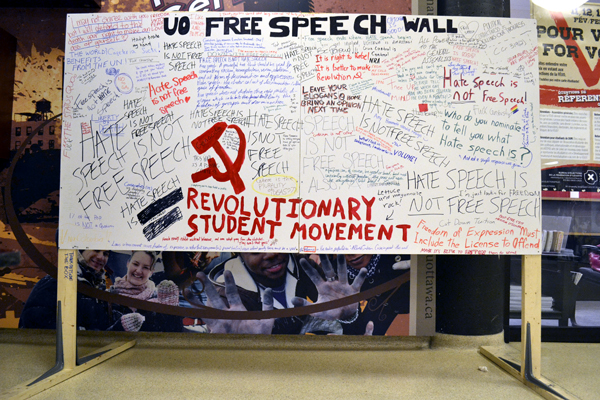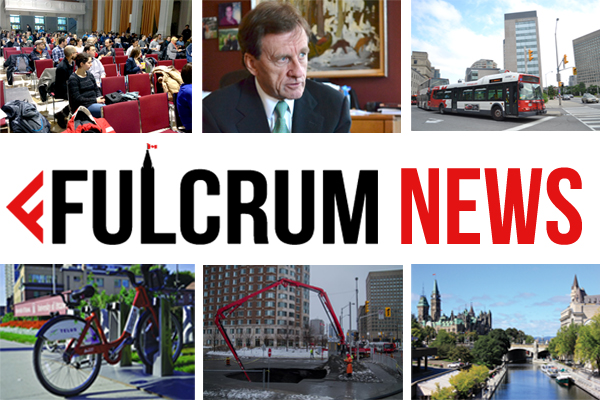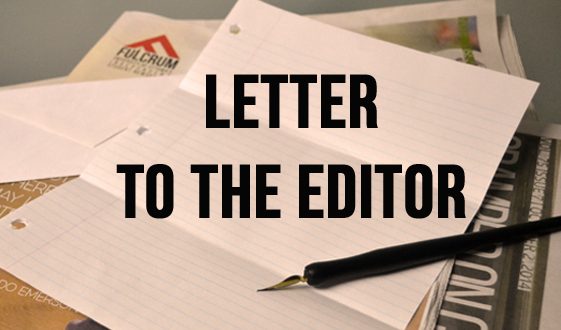Free speech wall erected in response to U of O’s failing grade on yearly free expression index
Photo by Julia RiddleThe University of Ottawa Liberty Society erected a wall of free speech Feb. 5–6 in response to the U of O’s failing grade on a free expression index released in October. The wall was intended to be an exercise in free speech for all students, but was covered with remarks from the Revolutionary Student Movement (RSM), formerly called the Marxist Students’ Association.
The Justice Centre for Constitutional Freedoms (JCCF) released its yearly campus freedom index in October that gave the U of O’s administration a failing grade and crowned it, alongside Carleton University, the worst university in Canada for free speech. The grade was primarily based on examples like Policy 28 — which stipulates the administration can require any level of security at an event at the organizer’s expense — protestors outside Ann Coulter’s speech in 2010, and the 2009 ban on Israeli apartheid posters.
“There have been several free speech walls around Canadian campuses already, including Carleton and Queen’s,” said third-year economics student Omar Benmegdoul, who was responsible for the U of O’s wall. “We thought it’d be a good idea to bring it here and see what happens.”
Benmegdoul said the university’s administration and Community Life Service were helpful in organizing the wall. He said he’s received a lot of differing reactions from the students and staff members that have visited the wall.
Benmegdoul added that he was disappointed when he discovered the wall had been covered in leftist slogans reading “hate speech is not freedom of speech,” which were tagged by the RSM.
“They appear to be radically opposed to the existence of the wall itself,” he said. “They covered the wall entirely in an effort to stop others from being to write on the wall as well.”
RSM member Jean-Philippe Ouellet said that what was written on the free speech wall was the work of one individual using the wall to promote the club, and that it was neither a club decision nor was it done with negative intentions. He added that the member used the wall as a billboard, which is free speech.
In response to the wall, U of O biology professor Jeremy Kerr tweeted, “There is activism then there is ‘activism.’ This is the latter. Zero evidence of lack of freedom @uOttawa.” He added that the free expression index is “pure nonsense.”
“I think the idea of a free speech wall and championing free speech is exemplary and is something that every faculty member, student, and member of the administration is almost obliged to support,” he said in an interview with the Fulcrum.
Kerr said he is actively involved in taking the position of promoting free speech, especially “given daily assaults on evidence and science by current government,” but that the “nature of (the index’s) criticism was fatuous.”
He said the free expression index is “just kind of like an assemblage of rumours that they’ve slapped together, and used as the basis for grading. I was appalled.” He said it and the free speech wall should be examined separately.
The JCCF has been sponsoring the building of free speech walls across Canadian campuses since 2013.
“The walls are a great way to open up discussion on campus about why free speech is so important on campus,” said Michael Kennedy, a communications and development coordinator for JCCF and the index’s co-author. “The activity is meant to promote a healthy discussion about whether the degree of censorship that the university partakes in is appropriate.”
Kennedy said the wall is also there to enable students to realize how expansive their freedom of speech is.
“It really promotes conversation, especially when students come up to you asking if they can write curse words or if they’re allowed to write about not liking the university,” he said.
“Somebody said that at Carleton there had been a lot of hateful things written,” Benmegdoul said. “I was bummed out about the negative feedback.”
—With files from Spencer Van Dyk





